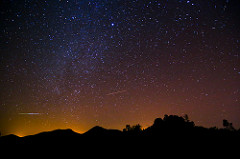
The Night in the Anthropocene Action Project group would like to thank David Ingram of the Seattle Astronomical Society and the International Dark Sky Association for making our Action Project possible. Due to weather complications traditional Dark Sky SAS events were cancelled. However, Dave offered a solution.
Simulated night sky experience in the UW Planetarium.
Using planetarium equipment, Dave was able to show our audience how the night sky was seen and interpreted in the past, present, and possibly how we will experience it in the future. Beyond the visual experience, Dave explained how the night sky has transcended culture and geographic location for centuries. Since the beginning of man, we have looked to the sky in wonder. It has been our greatest inspiration for art, society, and science. Human culture and even biology developed through the experience of the pure dark night.
Loss of the dark night has been linked to many health issues of the Anthropocene including the physical maturity of women at a younger age, the modern increase in sleeplessness, mental health issues, hormonal imbalances, and even the increased incidence of cancer. It is clear that preserving the purity of the night sky is not only an emotional concern for those who miss the stars or for those concerned about animal migration, it is an issue that we all must recognize and address throughout the Anthropocene regardless.
We must reduce light pollution and protect our night skies for the health and happiness of all creatures on this planet. At the current rate of light pollution our children may never see the stars. Simply the fact that we were unable to experience a natural night sky should be a desperate call to action.
We would like to take this opportunity to direct you to the Dark Sky Association website and the Seattle Astronomical Society websites. Both contain valuable information and possible event opportunities.
http://darksky.org/
http://www.seattleastro.org/
Photo by Joe Parks


It was fun seeing your guys’ presentation and see a focus on a part of the Anthropocene thats not usually talked about: light pollution and it’s negative side effects on society today. So many of the other issues are given way more attention, like atmospheric CO2, acidification of the oceans, and many more. Your presentation was refreshing!
Thank you Sean! Your group’s project also offered a fresh perspective. The effect of the Anthropocene on the mental capacity of humans is an interesting topic that I wish we had discussed more.
Lincoln,
This thank you to Dave Ingram was a must. He did a very good job at teaching us about the night sky and not just showing us the “30 ft planetarium” that he was fascinated with. My most memorable moment of the event was when we looked over North Korea while viewing where there is light pollution in the world from the sky. North Korea was basically dark, it actually shows us how restricted people are in North Korea when it comes to technology and lighting. In a sense, it legitimized the “light polluted” areas for me. I am glad you took the time to create a blog post on this particular subject. Being a part of your group this quarter has been a pleasure. Thank you for your great communication and scheduling in our group.
Thank you Damir. I am glad that this project gave me the opportunity to get to know you and the other group members. The image of North Korea was very powerful, especially in contrast to other countries in that region.